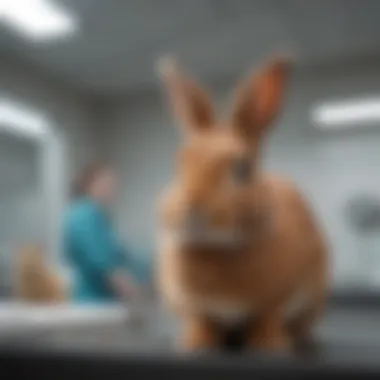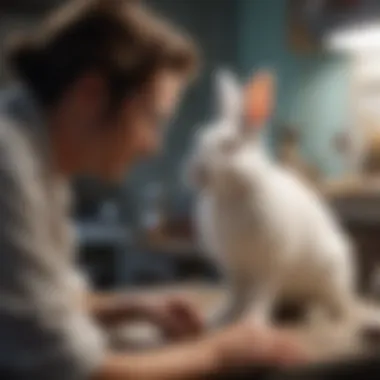How to Find the Ideal Veterinarian for Your Rabbit


Intro
Finding the right veterinarian for your rabbit can feel overwhelming. As these pets have unique needs, it is vital to engage a vet who is not only qualified but also has experience with rabbits. This guide will provide you with essential insights into rabbit care, vet qualifications, and how to build a strong relationship with your veterinary provider. By understanding your pet’s specific requirements, you can make informed decisions that will contribute to their health and happiness.
Understanding Your Pet
Pet Behavior Basics
Understanding rabbit behavior is crucial in ensuring their welfare. Rabbits display various forms of communication, including body language and vocalizations. For example, a relaxed rabbit tends to have a calm body posture with ears pointing slightly outward. On the other hand, a rabbit that thumps its hind legs may be signaling fear or discomfort.
Common Breed Characteristics
Different rabbit breeds come with their own set of characteristics. For instance, the Holland Lop is known for its friendly nature, while the Netherland Dwarf can be more energetic and social. Knowing these traits can help you communicate better with your pet, making it easier to address their needs.
Species-Specific Needs
Rabbits are not conventional pets. They require a proper diet, social interaction, and safe environments. They thrive on a mix of hay, fresh vegetables, and quality pellets. Additionally, they need daily exercise to prevent obesity and boredom. Understanding these specifics can guide you when discussing your pet’s care with a veterinarian.
Pet Care and Maintenance
Feeding Guidelines
Proper feeding is essential for your rabbit’s health. A diet rich in hay will promote good digestion and dental health. Treats should be limited and introduced slowly. Always consult your veterinarian to tailor a diet specific to your rabbit’s age and weight.
Grooming Essentials
Regular grooming is important, especially for long-haired breeds. Brushing can reduce shedding and prevent fur balls. Pay attention to their nails and claws as well. If they grow too long, it can cause pain or difficulty moving.
Hygiene Practices
Maintaining proper hygiene in your rabbit's living space is vital. Clean their enclosure regularly and ensure access to fresh water daily. This helps prevent health issues and keeps your environment pleasant.
Health and Wellness
Routine Vet Check-ups
Frequent vet visits are key to keeping your rabbit healthy. Regular check-ups can identify problems early. Make sure to keep track of inoculations and any significant health changes.
Vaccination Needs
Rabbits require specific vaccinations to protect against diseases such as myxomatosis and viral hemorrhagic disease. Follow your vet's advice on vaccination schedules to ensure your pet stays safe.
Recognizing Signs of Illness
Being aware of your rabbit's behavior changes is essential. Signs such as lack of appetite, lethargy, or changes in litter box habits may indicate a health issue. Promptly consulting your veterinarian is crucial in these situations.
Enrichment and Activities
Indoor vs.
Outdoor Activities
Providing enrichment is important for a rabbit's mental health. Whether indoors or outdoors, ensure they have space to hop and explore. For indoor rabbits, creating an obstacle course or providing safe toys can keep them engaged.
Interactive Toys and Games
Rabbits enjoy toys that stimulate their instincts. Simple items like cardboard boxes or untreated wood can be entertaining. Rotating toys regularly can prevent boredom and encourage active play.
Socialization Opportunities
Rabbits are social creatures. They often enjoy the company of other rabbits or even humans. Consider supervising playtime with gentle pets and interactions. Socialization can improve their overall wellbeing.
Here’s a quick summary:
- Understand rabbit behavior for better interaction.
- Recognize the needs of different breeds.
- Maintain regular vet check-ups and vaccinations.
- Provide ample enrichment opportunities.


Understanding Rabbit Care
Understanding rabbit care is essential for maintaining the health and well-being of these unique pets. Rabbits are not just pets; they are complex creatures with specific needs. Owners must grasp how to care for them effectively. This knowledge helps in recognizing the right veterinary care. It also allows owners to advocate for their rabbits when it comes to medical needs.
Rabbits have distinctive anatomical and physiological traits. These characteristics influence their nutritional requirements, temperament, and susceptibility to diseases. Educating oneself about rabbit care results in a more satisfying and enriching life for the rabbit. Plus, it enhances the pet-owner bond through informed interaction.
The Unique Health Needs of Rabbits
Rabbits have unique health requirements that necessitate specialized attention. Their digestive system differs significantly from other pets. A rabbit's gut depends heavily on a high-fiber diet to function properly. Hay should form the basis of their diet, supplemented with fresh vegetables. This is crucial for preventing gastrointestinal issues, which are common in rabbits.
Moreover, rabbit dentition grows continuously. This means regular dental check-ups are necessary to avoid overgrown teeth. If not managed, dental problems can lead to serious health issues, including pain and difficulty eating. Knowing these aspects is key for rabbit owners. They must be aware of the signs of distress or discomfort in their pets.
Common Illnesses in Rabbits
Like any other pet, rabbits are prone to specific illnesses. Some of the most vital ones include:
- Whisker Tooth Disease: A condition caused by improper dental care.
- Ear Mites: These pests can lead to severe discomfort and infections.
- GI Stasis: A serious condition related to their digestive system that can be life-threatening.
Recognizing the symptoms of these conditions is critical for timely medical intervention. Routine observation of the pet's behavior and health can lead to early detection of issues. This awareness ensures that any upcoming health concerns are addressed promptly.
Preventative Care and Routine Check-ups
Preventative care is paramount in rabbit health management. Regular veterinary visits aid in the early identification of potential health issues. A veterinarian experienced in rabbit care can provide essential vaccinations and dental checks. Also, spaying or neutering is an important topic to consider. This not only prevents unwanted litters but also can minimize health risks.
Routine check-ups should include:
- Examination of teeth for overgrowth.
- Assessment of weight and diet suitability.
- General health evaluations to check for common illnesses.
Preventative care empowers rabbit owners with knowledge about their pets' health and helps in forming a lasting relationship with their veterinarian. Following these steps allows for a longer, healthier life for the rabbit.
Why Choose a Veterinarian Specializing in Rabbits
When it comes to the well-being of rabbits, selecting a veterinarian who specializes in their care is profoundly significant. Rabbits differ considerably from cats and dogs, possessing unique health requirements and distinct anatomical structures. By opting for a veterinarian passionate about rabbit care, owners can ensure that their pets receive the best possible treatment, taking into account their specific needs.
Benefits of Specialized Care
Specialized veterinary care comes with several advantages. First and foremost, a veterinarian specializing in rabbits is often more informed about the common health issues that affect these animals. They possess a deeper understanding of dietary needs, behavioral aspects, and environment factors that play a crucial role in rabbit health. For instance, a specialized vet might recognize the importance of hay in a rabbit's diet, emphasizing how it aids in digestion.
In addition, these professionals are likely to keep updated with the latest research and advancements in rabbit medicine. They tend to be aware of appropriate treatments for illnesses such as dental problems, which are common in rabbits. This specialization can lead to more accurate diagnoses and effective treatment plans.
Moreover, a specialized veterinarian is usually more familiar with exotic animal emergencies. Their experience can be invaluable when a rabbit requires immediate attention. This can ultimately enhance the chances of a positive outcome during such critical moments.
Evaluating Veterinary Qualifications
When looking for a veterinarian, evaluating their qualifications is essential. Owners should check whether the vet has received specific training in exotic animal care. Degrees or certifications in veterinary medicine focused on rabbits or small mammals show a level of commitment that sets these veterinarians apart.
Also, consider their prior experience with rabbits. Questions about their practice history can provide insights into their expertise. A vet who has worked with rabbits for several years likely has developed a keen understanding of their care.
Understanding Veterinary Certifications
Understanding the certifications veterinarians hold reveals their level of proficiency. Look for credentials from reputable organizations, such as the American Board of Veterinary Practitioners. This board requires additional training and examinations in specific areas, reinforcing a veterinarian's expertise.
Furthermore, many veterinarians pursue continuing education courses to stay current with evolving practices and technologies related to rabbit care. Asking about these can help pet owners choose a vet committed to ongoing learning and patient welfare.
A veterinarian's specialization in rabbit care is a crucial factor in ensuring the health and well-being of a pet rabbit. Owners must prioritize this when making informed decisions.
How to Locate a Veterinarian for Rabbits Near You
Finding a veterinarian who understands rabbits is essential for their health and well-being. Rabbits have unique care needs, and not all veterinarians are equipped to handle them. Locating a specialized vet is a crucial step that ensures your pet receives the proper treatment, nutrition, and preventive care they require. It can significantly impact their longevity and quality of life. You can streamline the search process by focusing on how to effectively locate veterinarians who are knowledgeable about rabbit care.
Utilizing Online Resources
In the digital age, online resources serve as powerful tools for locating rabbit veterinarians. Websites dedicated to pet care often have directories that can help you find vets nearby who specialize in rabbits. Websites like Google Maps can be useful as well; searching "rabbit veterinarian near me" or "exotic animal vet" can yield helpful results. Additionally, professional organizations, such as the House Rabbit Society, maintain lists of vetted and recommended veterinarians specifically for rabbits. These resources not only provide names but often include reviews and ratings from other pet owners.
Seeking Recommendations
Word of mouth remains a reliable method for finding quality veterinary care. Speaking to other rabbit owners can provide invaluable insight and firsthand experiences. Consider joining local pet community groups on social media platforms like Facebook or dedicated forums on Reddit. Engaging with these communities can lead to recommendations for veterinarians who have a proven track record with rabbits. When asking for recommendations, be specific about your needs, and inquire about the vet’s experience and approach towards rabbit care.


Assessing Local Veterinary Clinics
Not every veterinary clinic is the right fit for your rabbit. Once you have a list of potential veterinarians, visit their clinics to assess their environment. Check for a clean and organized space, as this can indicate the quality of care provided. Observe how staff interacts with both animals and owners. It is also important to evaluate the available services, such as in-house lab tests or specialized treatments. You may want to ask about their approach to rabbit care during a visit. This can help you gauge their knowledge and comfort level with treating rabbits.
Finding the right veterinarian requires effort but will pay off in peace of mind and your rabbit's health.
Questions to Ask Prospective Veterinarians
Choosing the right veterinarian is a crucial process for ensuring the health and well-being of your rabbit. Asking the right questions will help you assess whether a potential vet is a good fit for your specific needs. Understanding the importance of these inquiries can make a significant difference in your rabbit's care and comfort.
Inquiring About Experience with Rabbits
One of the first questions to ask is about the veterinarian's experience with rabbits. Not all veterinary practices specialize in treating small animals, and even fewer focus exclusively on rabbits. A vet with extensive experience in rabbit care is more likely to recognize species-specific issues and behaviors. This expertise can lead to more accurate diagnoses and effective treatments.
You can ask questions like:
- How many years have you been treating rabbits?
- How often do you see rabbits compared to other pets?
- Can you provide references from other rabbit owners?
A professional familiar with rabbit-specific health conditions is better equipped to offer tailored advice. Understanding their level of experience will also give you insight into how comfortable they are handling your pet.
Understanding Treatment Approaches
Next, delve into the veterinarian's treatment philosophy. Each vet may have a different approach to diagnosing and treating illnesses. Knowing what to expect in terms of treatment can help you gauge whether their methods align with your expectations.
Inquire about:
- What does a typical treatment plan look like for a common ailment?
- How do you handle pain management in rabbits?
- Are there alternative treatment options you suggest?
Understanding their approach helps build trust. It also informs you about their willingness to consider your concerns and preferences in your rabbit's care. A vet who communicates openly about treatment options will likely foster a better relationship with you and your pet.
Clarifying Emergency Procedures
Emergencies can happen without warning. Knowing how a veterinarian handles urgent situations is vital. Inquire about their emergency procedures, as this knowledge can be critical in times of need.
Consider asking:
- Do you have after-hours services for emergencies?
- What do you recommend I do if my rabbit needs urgent care outside of regular hours?
- Can I contact you or a colleague in case of an urgent issue?
This information will empower you with the assurance that your rabbit will receive care when needed. Clarity on emergency procedures reinforces a sense of preparedness and security, both of which are essential for responsible pet ownership.
Remember: These questions are designed to foster a dialogue that can lead to a confident decision in choosing the right veterinarian for your rabbit.
Building a Relationship with Your Veterinarian
Building a trusting relationship with your veterinarian is essential for the well-being of your rabbit. This bond can significantly enhance your pet's health care journey. A good relationship cultivates an environment where you feel comfortable discussing your rabbit's needs, concerns, and behaviors. Additionally, it allows the veterinarian to better understand your rabbit's individual temperament and history, leading to more tailored care.
A strong relationship is built on a foundation of clear communication, mutual understanding, and respect. It helps you establish a consistent pattern of care, making it easier to address your rabbit's ongoing health requirements. It's crucial to remember that caring for a rabbit goes beyond routine visits; it involves developing a partnership that prioritizes their needs.
Communication and Trust
Effective communication with your veterinarian is paramount. Without it, misunderstandings can lead to issues in care, treatment plans, and overall rabbit welfare. You should feel empowered to ask questions about anything related to your rabbit's health—be it diet, behavior, or medical history. Trust your instincts and voice any concerns that arise. A veterinarian who is open, acknowledges your input, and provides clear explanations fosters trust.
It's also beneficial to keep a rabbit health journal. Noting changes in behavior, eating habits, or litter box use can aid discussions during vet visits. Your observations can lead to insights that are crucial in decision-making.
Regular Updates on Health and Care
Regular updates about your rabbit's health are important for effective management. This can take the form of routine check-ups or informal communications about any changes you observe. A veterinarian who takes the initiative to keep you informed builds a solid foundation of trust.
You should also proactively seek information regarding vaccinations, parasite prevention, and diet adjustments as needed. Keeping a channel of communication open ensures that you remain informed and engaged in your rabbit's care.
Feedback and Involvement in Care Decisions
Your involvement in care decisions is vital. A good veterinarian will welcome your feedback, recognizing you as a key part of your rabbit's healthcare team. Discussing treatment plans openly and being involved in decision-making leads to better adherence to care guidelines.
Given the unique nature of rabbits, your personal observations can reveal important information. Share your insights on your rabbit's response to treatments or changes in routine. This collaborative approach leads to a more holistic care plan that benefits your rabbit.
“Veterinary care is not just about treatment; it’s about a partnership that enhances the life of your beloved pet.”


By investing time in developing a robust relationship with your veterinarian, you not only secure better health outcomes for your rabbit but also create a rewarding experience for yourself as a conscientious pet owner.
Emergency Veterinary Services for Rabbits
Emergency veterinary services for rabbits are vital for ensuring the immediate health and safety of your pet. Rabbits, like all pets, can experience sudden illness or injury that requires prompt professional care. Recognizing a good emergency vet service can significantly affect the outcome of an emergency situation.
In a crisis, time is often of the essence. The ability to obtain specialized care swiftly can mean the difference between a rabbit's life and death. These services must be available outside of typical office hours, as emergencies can happen at any time. Therefore, selecting a veterinarian who offers robust emergency care is very essential.
Identifying Signs of Emergencies
Awareness of emergency signs can help you act quickly. Some indicators of a possible emergency in rabbits include:
- Lethargy: If your rabbit is unusually inactive or unresponsive, it may be a sign of distress.
- Changes in Appetite: A sudden loss of interest in food or water can indicate serious health issues.
- Respiratory Problems: If your rabbit is having difficulty breathing, wheezing, or making unusual noises, this requires immediate attention.
- Abnormal Behaviors: Many rabbits show signs of pain through altered behaviors such as hiding, aggression, or excessive grooming.
- Gastrointestinal Problems: If your rabbit shows signs of bloating or has not defecated in an abnormal timeframe, it could indicate a risky situation.
By recognizing these signs, you can take the necessary steps to seek professional care without delay.
Emergency Contact Information
It is crucial to have reliable emergency contacts readily available. Here are a few points to consider:
- Local Emergency Vet Clinics: Research and make a list of local veterinary clinics that provide emergency services for rabbits. Look specifically for those with experience in rabbit care.
- After-Hours Services: Ensure that these veterinary clinics offer after-hours services. Many firms will have guidelines about how to access their services outside of regular hours.
- Create a Fast Access Document: Keep an updated document with all relevant contact information. Include the names, addresses, and phone numbers of clinics, and also make note of any specific protocols for visiting.
- Community Resources: In case of emergency, having additional contacts from local pet communities or forums can help in finding immediate resources.
Always have emergency contacts available. Quick action can save your rabbit's life.
By preparing for emergencies beforehand, you will ensure that you can respond swiftly and efficiently when a crisis arises.
Costs and Payment Options for Veterinary Care
Understanding the financial aspects of veterinary care is essential for rabbit owners. Many factors contribute to the costs associated with keeping your rabbit healthy. This can include routine check-ups, vaccinations, and unexpected emergencies. Being aware of these expenses can help you prepare and ensure that your rabbit receives the necessary care without compromising its health.
Understanding Typical Costs
When you take your rabbit to the veterinarian, the costs can vary depending on several factors. Here are some common elements determining costs:
- Initial Consultations: Usually, the first visit may cost more. This might range from $50 to $150 based on location and clinic.
- Routine Treatments: Vaccinations and spaying/neutering can cost between $100 to $300. These treatments are critical for preventing health issues in the long term.
- Emergency Care: In case of emergencies, costs can surge significantly, often exceeding $500 or more, depending on the treatment required. Understanding this can help you prepare for any situations that may arise.
- Medication and Follow-up Visits: Additional costs include medications and any required follow-up visits, adding up to $100 or more based on treatment plans.
Understanding these typical costs enables rabbit owners to budget effectively and ensure that they have resources available for their pet's healthcare needs.
Insurance for Rabbit Veterinary Care
Insurance can be a valuable tool for managing veterinary costs. Here are important considerations regarding rabbit veterinary insurance:
- Choosing the Right Plan: Look for pet insurance plans that include coverage for rabbits. Not all pet insurance covers exotic pets, so it is essential to review the details carefully.
- Cost Coverage: Policies may vary widely in coverage, from basic accident and illness coverage to more comprehensive plans that include routine care and preventive treatments.
- Premiums and Deductibles: As with any insurance, you will pay premiums and potentially deductibles when you seek care. It’s important to find a balance that works for your budget.
- Reimbursement Process: Be prepared that most pet insurance operates on a reimbursement basis. This means you may need to pay the bill upfront and claim it later.
Insuring your rabbit can protect you against unexpected expenses, ensuring that your pet receives timely medical attention without significant financial strain.
In summary, understanding costs and payment options is vital for maintaining a rabbit's health. Knowledge about typical expenses and insurance options can better prepare you for the care your rabbit needs.
Resources for Ongoing Rabbit Care
Ongoing care for rabbits is essential for their health and happiness. Having access to reliable resources ensures you can provide the best life for your pet. It covers areas like health, nutrition, and behavioral understanding. This section will highlight key resources that can aid in maintaining optimal care for your rabbit.
Educational Materials
Educational materials are vital for rabbit owners. These resources can include books, articles, and online content that provide in-depth knowledge about rabbit care. New rabbit owners might not be familiar with specific needs or common behaviors of rabbits. They need clear guidance that covers nutrition, exercise requirements, and habitation.
Some recommended educational materials would be:
- Books on Rabbit Care: Titles such as “The No-Nose Rabbit book” or “Pet Rabbits: Caring for Your Rabbit” are excellent starting points. They offer insights into health care, rabbit behavior, and training tips.
- Online Articles and Blogs: Websites like Wikipedia and other animal care blogs provide updated information. These articles can discuss health assessments, diet considerations, and even fun activities to enrich their lives.
- Videos: Many platforms like YouTube have channels dedicated to rabbit care. Visual learning can be effective for practical tasks like grooming and handling.
By utilizing these educational materials, owners can foster a deeper understanding of how to maintain their rabbit’s well-being. It also helps them recognize signs of distress or illness earlier.
Rabbit Care Communities
Being part of a rabbit care community can be beneficial. These communities foster a supportive environment for both new and experienced rabbit owners. By engaging with others who share similar passions, owners can exchange knowledge and experiences.
You can find rabbit care communities in several forms:
- Online Forums: Websites like Reddit host discussions on pet care. Topics can range from diet recommendations to health concerns. Owners can share personal insights or ask for advice about specific situations.
- Social Media Groups: Facebook groups dedicated to rabbit care often feature tips, success stories, and warnings about harmful practices. Engaging in these groups can connect you with local resources, too.
- Local Clubs or Rescue Groups: In-person meetups can offer hands-on learning and networking opportunities. Some clubs organize events that teach proper care techniques, basic training methods, and even host adoption events.
Being part of a rabbit care community can provide real-world support. It creates an avenue for ongoing learning and connection. Rabbit care is a continuous journey, and having accessible, reliable information is a repeating theme in ensuring a healthy, happy pet.
Regularly updating your knowledge through these resources can significantly influence your ability to provide excellent care for your rabbit.







